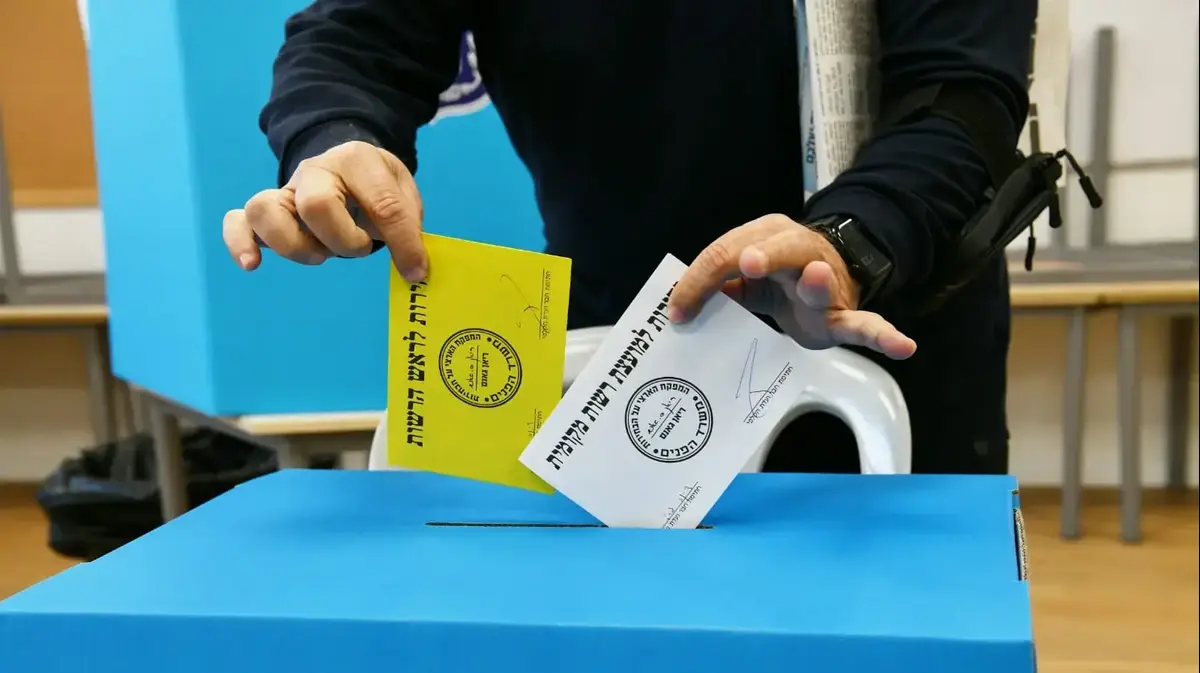The new government takes its place.
According to the opposition, the cost of the elections is small money compared to the cost of the agreements with the ultra-Orthodox (Photo: Reuven Castro)
Each round of elections, especially with the abnormal frequency of Israeli politics, costs us a lot of money, and more precisely - three and a half billion shekels.
Just less than three months ago, the last round ended, and following the High Court's decision to disqualify the appointment of Aryeh Deri as minister, the coalition is swaying - Orli Ades, the CEO of the Election Commission, is beginning to warm to the lines and another issue of Oleh is on the table again, even if hypothetically .
But, when you look at how much the current government will cost us, for its 32 ministers, six deputy ministers, the bureaus, the reforms it wants to pass, the coalition agreements and the long-term effects of its overall policy, three and a half billion shekels suddenly seems like very, very little money.
MK Vladimir Bliak of Yesh Atid, a CPA and a lawyer by training, and the center of the opposition in the finance committee, which
we will emphasize, is on the other side of the barrier - a calculation value of how much the current government will cost us in a full term of four years, and the sums are fantastic.
According to estimates,
the cost of setting up one government office
ranges from NIS 3 to 14 million per year, depending on its size.
If you take into account that ten of them, which were patched together or invented to please disgruntled politicians and coalition partners, you can save about 150 million shekels on average per year, which is 600 million shekels in a full term.
"And we've only just begun," Blayak adds, "because we haven't talked about the
six deputy ministers, who cost the public 2.5 million shekels per year per deputy, an annual cost of 15 million a year, 60 over four years
.
And what about the coalition agreements?
The cost of the agreement with Torah Judaism is estimated at 20 A billion shekels, with Shas between 10 and 15 billion and Otzma Yehudit another few billion, and we have already reached 40 billion shekels
.
"And we are not done. When you invest six billion shekels in an institution that does not teach core studies at all or teaches them partially, you further increase the
The state's loss due to non-employment of ultra-Orthodox workers, which amounts to 30 billion shekels per year
.
If the state does not encourage ultra-Orthodox to enter the labor market, and core studies are part of the basic conditions to join it, in ten years this loss will reach NIS 80 billion."
Member of Knesset Vladimir Blayak ("Yesh Atid") admits that the previous government also wasted, but warns against the consequences of the new coalition agreement (Photo: Reuven Castro)
The ultra-orthodox, the main threat to Israel's economy?
Prof. Omar Moab, from the Interdisciplinary Center and Warwick University and the host of the "Doing the math" podcast
, agrees with Bliak that Haredi employment costs us a fortune and government policy not only does not work to increase it, it encourages Haredim not to take part in the labor market.
"The main threat to the economy of the State of Israel is the ultra-Orthodox public. The fact that they don't work is the least significant problem, the biggest problem is the birth rate. A quarter of the children in Israel are ultra-Orthodox and we are heading towards an unsustainable situation.
"We need to invest in their education as much as possible, finance them core studies, and make them go out to work, because those who work make fewer children.
If we don't do it and as soon as possible, we will become a third world country, with no welfare services at all.
The current government does not intend to deal with this threat, on the contrary.
And we didn't talk about the legal reform.
Economic research states unequivocally that in countries where limitations are imposed on the power of the democratic government,
More in Walla!
Virtual reality therapy: a treatment for coping with anxiety
In collaboration with zap doctors
Minister of Housing Yitzhak Goldknopf.
Will the cost of the agreement with Torah Judaism cost us NIS 20 billion? (Photo: Reuven Castro)
Less democracy, less money?
But it's not only the encouragement of the ultra-Orthodox not to acquire the necessary skills that bothers Prof. Moav, but also the changes that threaten the justice system:
"In a dictatorial system at various levels, there is a significant decrease in the protection of the right to property and the freedom to operate economically. Democracy ties its hands so as not to steal from the citizens. The fear is that the state will intervene in the stock market, attach assets and print money. Singapore, for example, is not a democracy, but its government directs economic growth and restrains itself in terms of property rights. China is also less full of citizens' assets with this understanding.
"All developed countries have adopted the bank model the independent
They will say in the government - the governor was not elected and that the politicians will decide on monetary questions, as Gafni wants to do with interest on the mortgages, when he wants to bypass the governor.
When you reduce the power of the central bank, you get Turkey, where the government prints money and steals from the citizens.
"Suppose there is no separation between the government and the central bank, as was the case here until 1985. The government tells the bank, instead of imposing taxes, print money and I will use it to pay teachers and buy tanks. The value of money is eroding, there is inflation, and what we could buy for a hundred shekels a month ago, we cannot Buy today even for two hundred. You mustn't get confused, it's a tax. Unlike the income tax, here it's a tax that varies according to the level of inflation and how much cash you have with you. Therefore, it's good that there is a central bank that can raise the interest rate and curb inflation."
And how will the legal reform affect our economy?
"Why does the right want it so much, in order to establish what is happening here in East Jerusalem, say, where Arabs can be dispossessed of their homes and deprived of their property rights. And I am not sure that this will stop in the territories or in East Jerusalem. It will be possible to damage the property rights of a secular, leftist or gay".
These are the internal economic consequences.
The biggest fear is severe economic damage from the outside.
"The foreign investors are frightened by this. Israeli investors will also prefer to invest abroad, because no one would want their property rights to be harmed."
How much do you estimate the future economic damage following the current government's policies?
"I don't want to give numbers, but there is no doubt that potential The cumulative damage exceeds the cost of the coalition agreements, and it is enormous."
Prof. Omar Moab.
Warns against the consequences of encouraging ultra-Orthodox people not to integrate into the labor market (Photo: Flash 90, without)
And the government of change did not waste?
To be fair, it should be noted that the previous government was also not free from waste and unnecessary expenses.
"Honestly," MK Blayak agrees, "the previous government was too inflated and the Netanyahu Gantz government and the current government are still smaller.
We, in Yesh Atid, bear some of the responsibility for this and if we had more than 17 mandates, it could have been different.
We only took seven ministries, but there is no doubt that even in our government it was possible to save more.
In the long term, the government supported core studies and encouraging populations to go to work, and we also left ten billion shekels in the coffers.
"With the government we have today, there is no doubt that it is much cheaper for the State of Israel to go to the elections. It is similar to the story with the disposable dishes. The ultra-Orthodox said that the tax was imposed to burden them. We proved that if you buy a dishwasher, it is much cheaper to buy disposable dishes. The same the elections".
Of money
our money
Tags
coalition
Elections
religious
Vladimir Belyak















/cloudfront-eu-central-1.images.arcpublishing.com/prisa/H7U7FJNUZBG6BPL5PZCMGC6EUY.jpg)